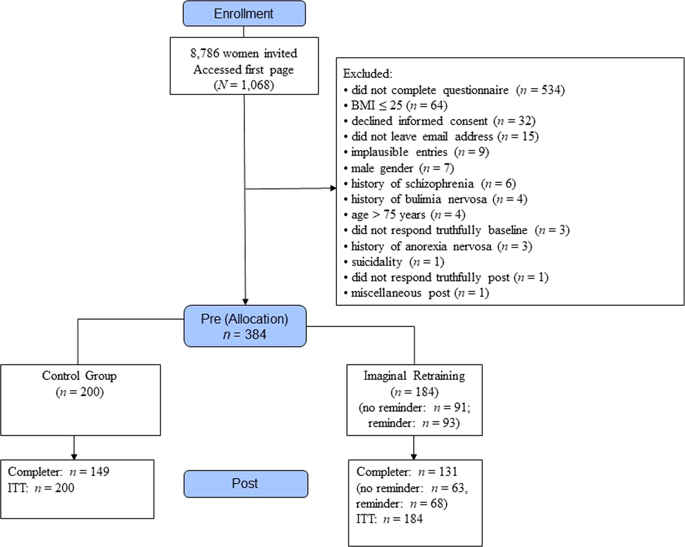当前位置:
X-MOL 学术
›
Transl. Psychiaty
›
论文详情
Our official English website, www.x-mol.net, welcomes your
feedback! (Note: you will need to create a separate account there.)
Imaginal retraining decreases craving for high-calorie food in overweight and obese women: A randomized controlled trial.
Translational Psychiatry ( IF 5.8 ) Pub Date : 2019-11-28 , DOI: 10.1038/s41398-019-0655-7 Steffen Moritz 1 , Anja S Göritz 2 , Stella Schmotz 1 , Roland Weierstall-Pust 3 , Josefine Gehlenborg 1 , Jürgen Gallinat 1 , Simone Kühn 1
Translational Psychiatry ( IF 5.8 ) Pub Date : 2019-11-28 , DOI: 10.1038/s41398-019-0655-7 Steffen Moritz 1 , Anja S Göritz 2 , Stella Schmotz 1 , Roland Weierstall-Pust 3 , Josefine Gehlenborg 1 , Jürgen Gallinat 1 , Simone Kühn 1
Affiliation

|
Overweight and obesity are epidemic conditions. Obesity is associated with somatic and psychological sequelae, including serious life-shortening disorders (e.g., diabetes). This study aimed to evaluate the efficacy of a newly developed imaginal variant of approach bias modification (i.e., imaginal retraining) for the reduction of craving for high-calorie food. In a randomized controlled trial, 384 women with a body mass index above 25 were allocated to a wait-list control group or to two variants of imaginal retraining (ratio: 1; 0.5; 0.5). The two intervention groups were sent a manual on imaginal retraining. One group was explicitly encouraged and instructed to use electronic reminders (RER); the standard retraining group (RS) was not encouraged to use electronic reminders. Assessments were 6 weeks apart and were carried out online. Craving for high-calorie food represented the primary outcome (based on the Visual Analog Scale, VAS). Secondary outcomes included the Food Cravings Questionnaire (FCQ-T-R). The study was registered as DRKS00017220. Women in the RER group utilized the retraining technique more often than those in the RS condition, and utilization frequency in turn was associated with improvement on craving and eating behavior scales. Both intention-to-treat and per-protocol analyses showed a favorable effect of the RER group, which achieved significance on the primary outcome, as well as on several other outcomes relative to controls at a small to medium effect size. For those participants who measured their weight before and after the assessment using a scale, weight loss in the RER group was significantly greater compared to the control group. Both retraining groups (RER: 39.4%; RS: 31.1%) reduced their subjective amount of eating relative to controls (24.2%). Approximately two-thirds of the sample (68.3%) performed the exercises at least once during the study period. The present results show that, when used regularly, imaginal retraining may reduce craving for high-calorie food in overweight and obese women. Of note, there was also evidence suggestive of weight reduction, although no diet or lifestyle change was recommended in the manual. Because a large subgroup neither read the manual nor performed the exercises, we recommend that future imaginal retraining be conveyed via short video clips.
中文翻译:

有想象力的再训练减少了超重和肥胖妇女对高热量食物的渴望:一项随机对照试验。
超重和肥胖是流行病。肥胖与躯体和心理后遗症有关,包括严重的缩短寿命的疾病(例如糖尿病)。这项研究的目的是评估一种新近发展的方法偏差修正的假想变体(即假想再训练)对减少高热量食物的渴望的功效。在一项随机对照试验中,将384名体重指数高于25的妇女分配到了等待名单对照组或两种虚构训练方法中(比例:1; 0.5; 0.5)。向两个干预组发送了关于虚构训练的手册。明确鼓励一个小组,并指示他们使用电子提醒(RER);不鼓励标准再培训小组(RS)使用电子提醒。评估相隔6周,并在线进行。对高热量食物的渴望代表了主要结果(基于视觉模拟量表,VAS)。次要结果包括食物渴望调查表(FCQ-TR)。该研究注册为DRKS00017220。RER组中的女性比RS中的女性更频繁地使用再培训技术,而使用频率又与渴望和进食行为量表的改善相关。意图治疗和按方案分析均显示RER组具有良好的效果,相对于中小效应水平的对照,RER组对主要结局以及其他几个结局均具有重要意义。对于那些使用量表在评估前后测量体重的参与者,RER组的体重减轻明显高于对照组。两个再培训组(RER:39.4%; RS:31.1%)相对于对照组(24.2%)都减少了他们的主观进食量。在研究期间,大约三分之二的样本(68.3%)至少进行了一次锻炼。目前的结果表明,定期使用想象的训练可以减少超重和肥胖妇女对高热量食物的渴望。值得注意的是,尽管手册中未建议改变饮食或生活方式,但也有证据表明体重减轻。由于很大的一个小组既不阅读手册也不进行练习,因此我们建议通过短视频剪辑传达未来的想象训练。3%)在研究期间至少进行了一次锻炼。目前的结果表明,定期使用想象的训练可以减少超重和肥胖妇女对高热量食物的渴望。值得注意的是,尽管手册中未建议改变饮食或生活方式,但也有证据表明体重减轻。由于很大的一个小组既不阅读手册也不进行练习,因此我们建议通过短视频剪辑传达未来的想象训练。3%)在研究期间至少进行了一次锻炼。目前的结果表明,定期使用想象的训练可以减少超重和肥胖妇女对高热量食物的渴望。值得注意的是,尽管手册中未建议改变饮食或生活方式,但也有证据表明体重减轻。由于很大的一个小组既不阅读手册也不进行练习,因此我们建议通过短视频剪辑传达未来的想象训练。
更新日期:2019-11-29
中文翻译:

有想象力的再训练减少了超重和肥胖妇女对高热量食物的渴望:一项随机对照试验。
超重和肥胖是流行病。肥胖与躯体和心理后遗症有关,包括严重的缩短寿命的疾病(例如糖尿病)。这项研究的目的是评估一种新近发展的方法偏差修正的假想变体(即假想再训练)对减少高热量食物的渴望的功效。在一项随机对照试验中,将384名体重指数高于25的妇女分配到了等待名单对照组或两种虚构训练方法中(比例:1; 0.5; 0.5)。向两个干预组发送了关于虚构训练的手册。明确鼓励一个小组,并指示他们使用电子提醒(RER);不鼓励标准再培训小组(RS)使用电子提醒。评估相隔6周,并在线进行。对高热量食物的渴望代表了主要结果(基于视觉模拟量表,VAS)。次要结果包括食物渴望调查表(FCQ-TR)。该研究注册为DRKS00017220。RER组中的女性比RS中的女性更频繁地使用再培训技术,而使用频率又与渴望和进食行为量表的改善相关。意图治疗和按方案分析均显示RER组具有良好的效果,相对于中小效应水平的对照,RER组对主要结局以及其他几个结局均具有重要意义。对于那些使用量表在评估前后测量体重的参与者,RER组的体重减轻明显高于对照组。两个再培训组(RER:39.4%; RS:31.1%)相对于对照组(24.2%)都减少了他们的主观进食量。在研究期间,大约三分之二的样本(68.3%)至少进行了一次锻炼。目前的结果表明,定期使用想象的训练可以减少超重和肥胖妇女对高热量食物的渴望。值得注意的是,尽管手册中未建议改变饮食或生活方式,但也有证据表明体重减轻。由于很大的一个小组既不阅读手册也不进行练习,因此我们建议通过短视频剪辑传达未来的想象训练。3%)在研究期间至少进行了一次锻炼。目前的结果表明,定期使用想象的训练可以减少超重和肥胖妇女对高热量食物的渴望。值得注意的是,尽管手册中未建议改变饮食或生活方式,但也有证据表明体重减轻。由于很大的一个小组既不阅读手册也不进行练习,因此我们建议通过短视频剪辑传达未来的想象训练。3%)在研究期间至少进行了一次锻炼。目前的结果表明,定期使用想象的训练可以减少超重和肥胖妇女对高热量食物的渴望。值得注意的是,尽管手册中未建议改变饮食或生活方式,但也有证据表明体重减轻。由于很大的一个小组既不阅读手册也不进行练习,因此我们建议通过短视频剪辑传达未来的想象训练。











































 京公网安备 11010802027423号
京公网安备 11010802027423号